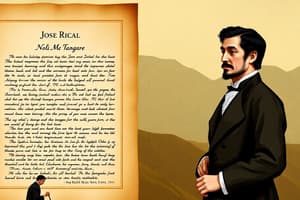Podcast
Questions and Answers
What is the title of the novel written by Jose Rizal under the pseudonym Juan Crisostomo Ibarra y Mija?
What is the title of the novel written by Jose Rizal under the pseudonym Juan Crisostomo Ibarra y Mija?
- The Social Evils of Spain
- The European Journey of Crisostomo Ibarra
- Touch Me Not (correct)
- Awakening National Consciousness
Where did Jose Rizal write Noli Me Tangere?
Where did Jose Rizal write Noli Me Tangere?
- Madrid and London
- New York City
- Paris and Berlin (correct)
- Manila, Philippines
What are two foundational aspects of contemporary Filipino identity introduced in Noli Me Tangere?
What are two foundational aspects of contemporary Filipino identity introduced in Noli Me Tangere?
- Government Structure and Economic System
- Celebration of Festivals and Religious Practices
- Nuanced portrayal of societal issues and awakening national consciousness (correct)
- Cuisine and Music
What themes are explored in Noli Me Tangere?
What themes are explored in Noli Me Tangere?
Who is the main character in Noli Me Tangere?
Who is the main character in Noli Me Tangere?
In which country did Jose Rizal study law before returning home in Noli Me Tangere?
In which country did Jose Rizal study law before returning home in Noli Me Tangere?
What is the primary theme of Noli Me Tangere as discussed in the text?
What is the primary theme of Noli Me Tangere as discussed in the text?
Which character in Noli Me Tangere symbolizes spiritual hypocrisy and moral decadence?
Which character in Noli Me Tangere symbolizes spiritual hypocrisy and moral decadence?
In what way does Captain Tinóbrus represent a theme explored in Noli Me Tangere?
In what way does Captain Tinóbrus represent a theme explored in Noli Me Tangere?
What literary tools did José Rizal use in Noli Me Tangere to highlight colonial system shortcomings?
What literary tools did José Rizal use in Noli Me Tangere to highlight colonial system shortcomings?
El Filibusterismo serves as a sequel to which work by José Rizal?
El Filibusterismo serves as a sequel to which work by José Rizal?
What modern discourses have been shaped by the novels of José Rizal according to the text?
What modern discourses have been shaped by the novels of José Rizal according to the text?
Flashcards are hidden until you start studying
Study Notes
Noli Me Tangere's Impact on Philippine History through the Lens of Jose Rizal
José Rizal, often hailed as one of the greatest figures in Filipino history, was a physician by training and a multifaceted intellectual whose contributions to literature, philosophy, and political thought continue to shape our understanding of colonial Philippines and its struggle against Spanish rule. One of his most renowned works, Noli Me Tangere ("Touch Me Not"), published under the pseudonym Juan Crisostomo Ibarra y Mija, introduced the world to two foundational aspects of contemporary Filipino identity: a nuanced portrayal of societal issues within the Spanish colonial context and a bold call to action aimed at awakening national consciousness among Filipinos.
Written between 1886 and 1889 during his six years abroad, Noli Me Tangere delves into themes like corruption, poverty, gender inequality, and Westernization—themes still relevant today yet unaddressed when Rizal penned the book. Operating from European locales such as Paris and Berlin, this fiction-based narrative offers a critical commentary on Spanish colonialism, providing readers with a glimpse into the complex realities faced by Filipinos living under the imperialist rule.
The novel is structured around the story of Crisostomo Ibarra, a young man who returns home after studying law in Europe only to discover and confront the social evils plaguing his homeland. As he navigates through the perspectives of various characters representing different segments of society, Ibarra embarks on a journey towards self-discovery and ultimately leads to his tragic demise due to his ideological and romantic pursuits. This tragic end serves as a powerful reminder of the consequences of standing up against oppression despite seemingly insurmountable obstacles.
Among other notable characters featured in Noli Me Tangere, Padre Damaso stands out as a symbol of spiritual hypocrisy and moral decadence, while Captain Tinóbrus represents the apathy and cowardice ruling class exhibits towards their subjects. These characterizations illustrate how Rizal used literary tools, such as satire, irony, allegory, and foreshadowing, to highlight the shortcomings inherent in the colonial system and spark discussions regarding the need for reform and liberation.
Rizal's second seminal work, El Filibusterismo ("The Reign of Greed"), acts as a sequel to Noli Me Tangere. It continues along similar lines of criticism and analysis, offering further insights into the intricate web of power dynamics and socioeconomic disparity present in precolonial and colonial societies. Together, these novels have played a vital role in shaping modern discourses surrounding Philippine history and culture, inspiring generations of intellectuals, artists, revolutionaries, and advocators alike to fight for justice, equality, and nationhood.
In conclusion, Noli Me Tangere remains an influential piece of historical artistry due largely to José Rizal's masterful blend of cultural introspection, revolutionary rhetoric, and vividly drawn narratives. By examining prevailing societal norms and delving deeply into the human condition, Rizal created a timeless narrative that echoes throughout the pages of history, continuing to serve as a source of inspiration for Filipinos everywhere seeking to understand their past, embrace their present, and cultivate a better future.
Studying That Suits You
Use AI to generate personalized quizzes and flashcards to suit your learning preferences.




